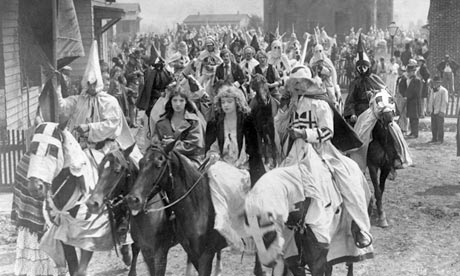
The birth of cinema was brutal and ugly, and the photographic evidence comes with a health warning attached. The Birth of a Nation, directed by DW Griffith back in 1915, has a reputation as one of the greatest movies ever made – and one of the most purely vile. In the past few decades it has been rarely screened and hard to find. This, perhaps, is akin to physicists discovering the God particle and deciding not to tell us – on account of the God particle actually being a murderous old bigot.
Until this week I confess I'd seen only snippets from Griffith's film (the same film, remember, that is reputed to be the forefather of every other film). Then, as luck would have it, The Birth of a Nation was reissued on DVD and Blu-ray, and the time seemed right for the full unabridged horror. The legends do not lie. The Birth of a Nation is every bit as astounding as it's cracked up to be, and for good reasons as well as bad.
Griffith's three-hour, silent epic was adapted from a spectacularly racist novel (The Clansman, by Thomas Dixon) and offers a reactionary spin on one of America's great founding myths. Kicking off in 1860, the action leads us through the carnage of the civil war and thence into the inferno of the Reconstruction, an era defined by rampaging "negro militias" and schemes to forge a nightmarish "black empire" from the defeated southern states. Griffith makes clear that, in this topsy-turvy world, no white woman is safe from molestation. Quoting Woodrow Wilson, he argues that the only solution is a last-gasp cavalry charge by "the great KKK". Hoods pulled down, crosses burning, the Klansmen duly ride to the rescue. Gus is a freed slave who dreamed of wedding a white girl. The Klansmen find him, lynch him and dump his body on the porch. Lest there be any confusion, this is depicted as the best possible result.
Small wonder the Ku Klux Klan used The Birth of a Nation as a recruitment tool right up until the 1970s. Its ideology is ironclad, intractable – and was controversial even in its day. Throughout the film, Griffith switches back and forth between African American extras and white performers with their features blacked-up. But there is no variety or nuance here. The freed slaves are depicted as stupid but wily, hell-bent on defiling white ladies and crushing their former masters. In one especially queasy scene, Griffith depicts an infestation of black politicians inside the state legislature, gurning and laughing and parking their bare feet on the desks. "The honourable member for Ulster", reads one intertitle, after which we are shown a shaven-headed dope swigging whisky from the bottle.
But here's the thing: The Birth of a Nation is also extraordinary in other respects. Yes, we all know that the film established the building blocks of cinema grammar (the establishing shot, the close-up, the cutaway) that mainstream directors have used ever since. But it's one thing to be told this, and quite another to see it in action. Griffith's language is so fluent, so confident, that it's hard to believe that he was essentially speaking it for the first time. I love his nimble movement around the sharecropper cabins and the way he pans from the main action to frame the dogs and the cats at the character's feet. The battle sequences, too, are astonishing, as the soldiers scurry, the corpses pile high and vast plumes of cannon smoke rip across the field.
Does the film's technical excellence excuse its racist leanings? Of course it doesn't; the movie is rancid. And yet, I'm wary to be too censorious about it. Films, in the first place, are a product of their time. I suspect there are numerous elements that we blithely accept in today's motion pictures that future generations will look upon with horror.
Secondly, and more troublingly, I'm not convinced that good art only qualifies as good art if it complements our view of what goodness means. Yes, art can reassure us that we are on the right moral track; that our values are sound and the consensus speaks truth. But if we accept that art can also challenge and provoke us, does it not follow that it can disturb and outrage us – and possibly even repel us? I found The Birth of a Nation to be offensive, poisonous propaganda – and this was a comfort. But I also found it fascinating, gripping and the work of a master. And this was more worrying. Almost a century on, Griffith's rabid, racist tour-de-force has lost none of its voltage. The Birth of a Nation is cinema's toxic tide-pool, its corrupted semen. It is the original sin that sired a century of dreams.
Endnote: The Birth of a Nation is out now on Eureka Entertainment's Masters of Cinema series; price £19.99.

